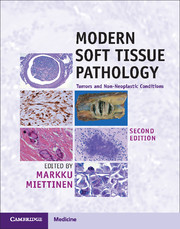Book contents
- Modern Soft Tissue Pathology
- Modern Soft Tissue Pathology
- Copyright page
- Contents
- Contributors
- Preface and Acknowledgements
- Chapter 1 Overview of soft tissue tumors
- Chapter 2 Radiologic evaluation of soft tissue tumors
- Chapter 3 Immunohistochemistry of soft tissue tumors
- Chapter 4 Genetics of soft tissue tumors
- Chapter 5 Molecular genetics of soft tissue tumors
- Chapter 6 Fibroblast biology, fasciitis, retroperitoneal fibrosis, and keloids
- Chapter 7 Fibromas and benign fibrous histiocytomas
- Chapter 8 Fibromatoses
- Chapter 9 Benign fibroblastic and myofibroblastic proliferations in children
- Chapter 10 Childhood fibroblastic and myofibroblastic proliferations of variable biologic potential
- Chapter 11 Myxomas and ossifying fibromyxoid tumor
- Chapter 12 Solitary fibrous tumor, hemangiopericytoma, and related tumors
- Chapter 13 Fibroblastic and myofibroblastic neoplasms with malignant potential
- Chapter 14 Lipoma variants and conditions simulating lipomatous tumors
- Chapter 15 Atypical lipomatous tumors and liposarcomas
- Chapter 16 Smooth muscle tumors
- Chapter 17 Gastrointestinal stromal tumor (GIST)
- Chapter 18 Stromal tumors and tumor-like lesions of the female genital tract
- Chapter 19 Angiomyolipoma and other perivascular epithelioid cell tumors (PEComas)
- Chapter 20 Rhabdomyomas and rhabdomyosarcomas
- Chapter 21 Hemangiomas, lymphangiomas, and reactive vascular proliferations
- Chapter 22 Hemangioendotheliomas, angiosarcomas, and Kaposi’s sarcoma
- Chapter 23 Glomus tumor, glomangiopericytoma, myopericytoma, and juxtaglomerular tumor
- Chapter 24 Nerve sheath tumors
- Chapter 25 Neuroectodermal tumors: melanocytic, glial, and meningeal neoplasms
- Chapter 26 Paragangliomas
- Chapter 27 Primary soft tissue tumors with epithelial differentiation
- Chapter 28 Malignant mesothelioma and other mesothelial proliferations
- Chapter 29 Merkel cell carcinoma and metastatic and sarcomatoid carcinomas involving soft tissue
- Chapter 30 Cartilage- and bone-forming tumors
- Chapter 31 Small round cell tumors
- Chapter 32 Alveolar soft part sarcoma
- Chapter 33 Pathology of synovia and tendons
- Chapter 34 Miscellaneous tumor-like lesions, and histiocytic and foreign body reactions
- Chapter 35 Lymphoid, myeloid, histiocytic, and dendritic cell proliferations in soft tissues
- Chapter 36 Cytology of soft tissue lesions
- Chapter 37 Surgical management of soft tissue sarcoma: histologic type and grade guide surgical planning and integration of multimodality therapy
- Chapter 38 Medical oncology of soft tissue sarcomas
- Index
- References
Chapter 6 - Fibroblast biology, fasciitis, retroperitoneal fibrosis, and keloids
Published online by Cambridge University Press: 19 October 2016
- Modern Soft Tissue Pathology
- Modern Soft Tissue Pathology
- Copyright page
- Contents
- Contributors
- Preface and Acknowledgements
- Chapter 1 Overview of soft tissue tumors
- Chapter 2 Radiologic evaluation of soft tissue tumors
- Chapter 3 Immunohistochemistry of soft tissue tumors
- Chapter 4 Genetics of soft tissue tumors
- Chapter 5 Molecular genetics of soft tissue tumors
- Chapter 6 Fibroblast biology, fasciitis, retroperitoneal fibrosis, and keloids
- Chapter 7 Fibromas and benign fibrous histiocytomas
- Chapter 8 Fibromatoses
- Chapter 9 Benign fibroblastic and myofibroblastic proliferations in children
- Chapter 10 Childhood fibroblastic and myofibroblastic proliferations of variable biologic potential
- Chapter 11 Myxomas and ossifying fibromyxoid tumor
- Chapter 12 Solitary fibrous tumor, hemangiopericytoma, and related tumors
- Chapter 13 Fibroblastic and myofibroblastic neoplasms with malignant potential
- Chapter 14 Lipoma variants and conditions simulating lipomatous tumors
- Chapter 15 Atypical lipomatous tumors and liposarcomas
- Chapter 16 Smooth muscle tumors
- Chapter 17 Gastrointestinal stromal tumor (GIST)
- Chapter 18 Stromal tumors and tumor-like lesions of the female genital tract
- Chapter 19 Angiomyolipoma and other perivascular epithelioid cell tumors (PEComas)
- Chapter 20 Rhabdomyomas and rhabdomyosarcomas
- Chapter 21 Hemangiomas, lymphangiomas, and reactive vascular proliferations
- Chapter 22 Hemangioendotheliomas, angiosarcomas, and Kaposi’s sarcoma
- Chapter 23 Glomus tumor, glomangiopericytoma, myopericytoma, and juxtaglomerular tumor
- Chapter 24 Nerve sheath tumors
- Chapter 25 Neuroectodermal tumors: melanocytic, glial, and meningeal neoplasms
- Chapter 26 Paragangliomas
- Chapter 27 Primary soft tissue tumors with epithelial differentiation
- Chapter 28 Malignant mesothelioma and other mesothelial proliferations
- Chapter 29 Merkel cell carcinoma and metastatic and sarcomatoid carcinomas involving soft tissue
- Chapter 30 Cartilage- and bone-forming tumors
- Chapter 31 Small round cell tumors
- Chapter 32 Alveolar soft part sarcoma
- Chapter 33 Pathology of synovia and tendons
- Chapter 34 Miscellaneous tumor-like lesions, and histiocytic and foreign body reactions
- Chapter 35 Lymphoid, myeloid, histiocytic, and dendritic cell proliferations in soft tissues
- Chapter 36 Cytology of soft tissue lesions
- Chapter 37 Surgical management of soft tissue sarcoma: histologic type and grade guide surgical planning and integration of multimodality therapy
- Chapter 38 Medical oncology of soft tissue sarcomas
- Index
- References
- Type
- Chapter
- Information
- Modern Soft Tissue PathologyTumors and Non-Neoplastic Conditions, pp. 181 - 203Publisher: Cambridge University PressPrint publication year: 2016

